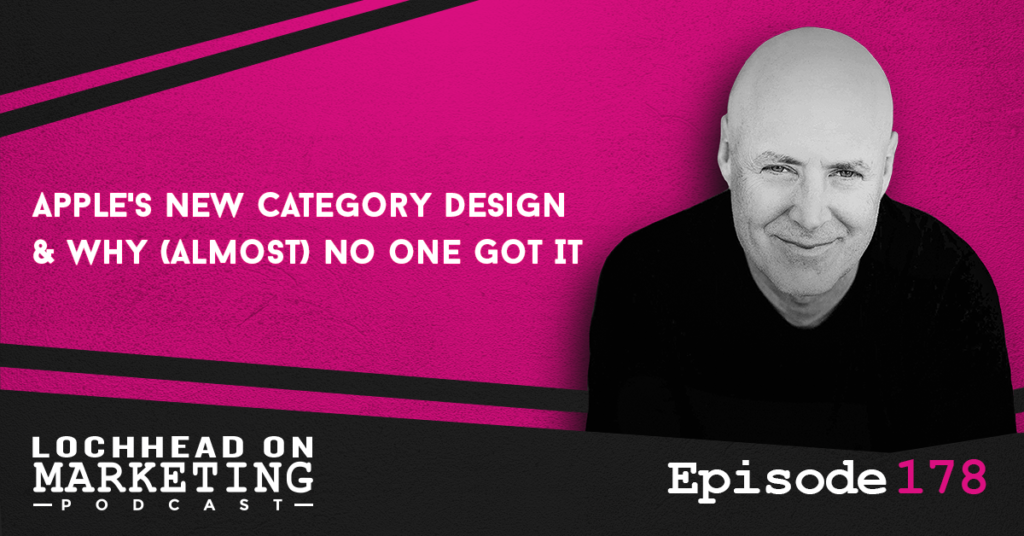178 Apple’s New Category Design & Why(almost) No One Got It

Podcast (lochheadonmarketing): Play in new window | Download (Duration: 8:42 — 6.0MB) | Embed
Subscribe: Apple Podcasts | Spotify | RSS | More
Apple announced some powerful new stuff at their Worldwide Developer Conference. And, as usual, many people in the business press, Twitter, and in Silicon Valley didn’t see what happened in plain sight. So here we are again, explaining why this new category is different from the other virtual and reality augmentation devices out there, and why it is important.
Welcome to Lochhead on Marketing. The number one charting marketing podcast for marketers, category designers, and entrepreneurs with a different mind.
Don’t just launch products, launch categories
Let me put it to you this way. Google launches products, aka Google Glass. Facebook, launches products, aka Oculus. Meanwhile, Apple does Category Design.
It’s fascinating to us that category design hides in plain sight. Because what most people got wrong is they think that Apple introduced a product called Vision Pro. And yes, of course, they did that. But they did not make the same mistake that Google and Facebook made, which is they just launch products; Apple designs categories. And they tell you that’s exactly what they’re doing.
Press Release for Apple Vision Pro
Here’s the headline: introducing Apple Vision Pro, Apple’s first spatial computer.
And what you have is the new product and brand Apple vision Pro. And they tell you what it is. It’s a spatial computer. It’s not a VR/AR headset. It’s not some kind of other variety – It’s a spatial computer. And if you go on to read the press release, what you’ll discover is that Tim Cook’s quote sums the whole thing up. “Today marks the beginning of a new era for computing,” said Tim Cook, Apple’s CEO. Just as the Mac introduced us to personal computing, and iPhone introduced us to mobile computing, Apple Vision Pro introduces us to spatial computing. And that, my friends, is the difference between marketing a category and just a product.
Creating a new computing platform
And this is what most people miss. And the reason they did it at their worldwide developer conference, is because they want the vision pro spatial computer to become a new compute platform. Just like the iPhone became a new compute platform, the personal computer became a new compute platform. That’s what they’re doing here. The iPad, etc. became a new platform, a new category of technology, not just a product that they gave to people.
Launching a product without a category is like a loose cannon
When Google launched Google Glass, they launched a product, they never articulated a problem that that product solved. They never evangelized a different future with that product. What they did was show a bunch of features. And because they didn’t provide the strategic context for understanding of what the product was, aka category, they left it up to customers and the media to decide.
Well, what happened? If you don’t control your own category narrative, somebody else will. And so what emerged about Google Glass? Well, number one, because they did the launch in Silicon Valley, the people who used it immediately got the nickname of “glass-holes”, because it was rich assholes using Google Glass and beta and early release driving around in their Tesla’s and the like, that sort of drew the ire of much of the world.
To hear more on what Apple did right with the launch of their new category, download and listen to this episode.
Bio
Christopher Lochhead is a #1 Apple podcaster and #1 Amazon bestselling co-author of books: Niche Down and Play Bigger.
He has been an advisor to over 50 venture-backed startups; a former three-time Silicon Valley public company CMO and an entrepreneur.
Furthermore, he has been called “one of the best minds in marketing” by The Marketing Journal, a “Human Exclamation Point” by Fast Company, a “quasar” by NBA legend Bill Walton and “off-putting to some” by The Economist.
In addition, he served as a chief marketing officer of software juggernaut Mercury Interactive. Hewlett-Packard acquired the company in 2006, for $4.5 billion.
He also co-founded the marketing consulting firm LOCHHEAD; the founding CMO of Internet consulting firm Scient, and served as head of marketing at the CRM software firm Vantive.
Don’t forget to grab a copy (or gift!) of one of our best-selling books:
Snow Leopard: How Legendary Writers Create A Category Of One
The Category Design Toolkit: Beyond Marketing: 15 Frameworks For Creating & Dominating Your Niche
A Marketer’s Guide To Category Design: How To Escape The “Better” Trap, Dam The Demand, And Launch A Lightning Strike Strategy
We hope you enjoyed this episode of Lochhead on Marketing™! Christopher loves hearing from his listeners. Feel free to email him, connect on Facebook, Twitter, Instagram, and subscribe on iTunes!

